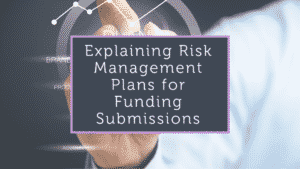When we review unsuccessful grant applications at Whitney Consulting, we notice the same patterns over and over: A complete misunderstanding as to the type of language that’s required. Specifically, it’s the misguided belief that complex language equals credibility and quality.
Researchers have spent decades analysing the language complexity used in political campaigns – both successful and unsuccessful ones – and the findings were striking but consistent. Successful political campaigns consistently used around around a third-grade level writing whilst the unsuccessful campaigns averaged eighth to ninth-grade complexity.
Before you bristle at the suggestion that this “dumbs down” communication, consider what this research actually reveals about human psychology and decision-making.
Why Simple Language Persuades (And Complex Language Confuses)
This isn’t about intelligence. It’s about cognitive load.
When assessors review hundreds of grant applications, they’re operating under significant time pressure and mental fatigue. Every unnecessarily complex sentence forces their brain to work harder to extract meaning. Every piece of jargon creates a small barrier between your message and their understanding.
When you try to sound impressive rather than clear:
Complex Language Creates Distance
- Assessors struggle to grasp your core message
- Key points get buried in unnecessarily elaborate explanations
- Decision-makers can’t quickly identify why your project matters
Simple Language Builds Connection
- Your message lands immediately
- Assessors can focus on evaluating merit rather than decoding meaning
- Your project’s value becomes impossible to ignore
Don’t fall into this trap. Instead, let’s look at the approach that transforms applications from confusing to compelling.
Start With Your Core Message
If your key messages are “We are the most qualified organisation because we have the exact experience, the right team, and proven methodology,” then state exactly that and clearly explain how.
Don’t write: “Our organisation brings a comprehensive suite of capabilities, leveraging our extensive portfolio of successful project deliverables across multiple sectors, underpinned by our highly qualified interdisciplinary team and cutting-edge methodological approaches.” Instead, write “We are the best choice for this project because:
- We have completed five identical projects in the past two years
- Our team includes three specialists with direct experience in this field • We use proven methods that deliver results on time and within budget”
Apply the Third-Grade Test
This doesn’t mean writing like you’re addressing children. It means choosing clarity over complexity at every opportunity:
Instead of: “Our methodology encompasses a holistic approach to stakeholder engagement utilising best-practice consultation frameworks.”
Write: “We will talk to everyone affected by this project using these proven consultation methods…”
Instead of: “The anticipated outcomes will facilitate enhanced community connectivity and social cohesion.”
Write: “This project will help people in the community connect with each other by…”
Don’t bury your competitive advantages in dense paragraphs. Make sure your strengths are impossible to miss by leading with them clearly and supporting them with evidence.
“We are the right choice because [clear statement of advantage].” Then provide the evidence in simple, scannable bullet points.
The Real Test of Effective Grant Writing is whether someone outside your industry quickly understand why your project matters and why you’re qualified to deliver it. If the answer is no, you’re not being simple enough. Test it by giving a friend your application to read. Do they immediately “get” your project and all the elements of it?
Remember, the goal of your grant application isn’t to showcase your vocabulary or demonstrate how sophisticated your thinking is. The goal is to make it impossible for assessors to say no to funding your important work.
In today’s funding landscape, assessors review more applications than ever before and so getting this right matters. Funding bodies have less time to spend decoding complex language and hunting for key messages buried in elaborate prose and pages of word soup.
The applications that rise to the top are those that respect the assessor’s time by presenting information clearly, directly, and persuasively.
Your project deserves funding, so don’t let complicated language stand between your brilliant idea and the resources it needs to succeed.
Your Next Step
Look at your last grant application or project proposal. Find your three strongest selling points. Can you state each one in a single, clear sentence? If not, you know where to start.
The most powerful applications don’t try to impress with complexity. They persuade through clarity. Make every word count, and make every message clear. Because when it comes to securing funding, simple wins.




